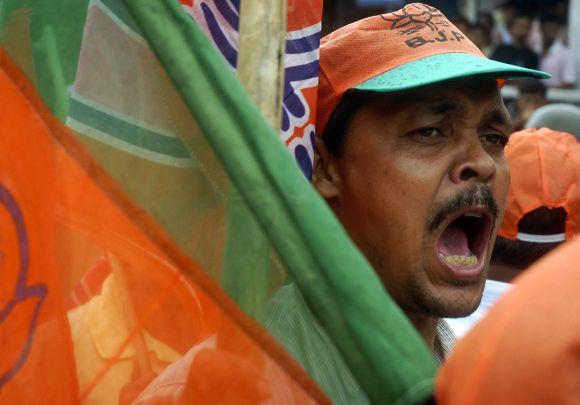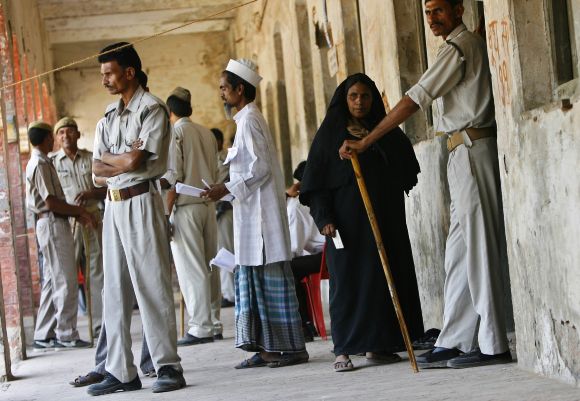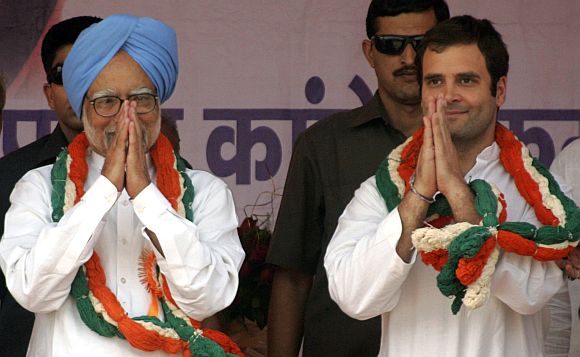
Muslims have never voted for the BJP in any parliamentary election. Even when Atal Bihari Vajpayee was projected as the prime minister, Muslims opposed the BJP. So, presenting a liberal face for the sake of blunting the Muslim opposition is not such a great idea, says G V L Narasimha Rao.
Does the Bharatiya Janata Party need a 'liberal' leader to present a softer image to the Muslims? This is the demand made by Bihar Chief Minister and Janata Dal-United leader Nitish Kumar. In my view, this Muslim-centric thinking is not only flawed but a treacherous attempt to isolate the BJP and its parent body the Rashtriya Swayamsevak Sangh and push them on the defensive.
The moot question is whether the BJP should pander to such demands for a liberal leader to increase its acceptability among Muslims. To my mind, the answer is a firm no. I cite two reasons in support of my stand:
Firstly, Muslims have never voted for the BJP in any parliamentary election. Even when Atal Bihari Vajpayee was projected as the prime minister, Muslims vehemently opposed the BJP in every single parliamentary election. So, presenting a liberal face for the sake of blunting the Muslim opposition is not such a great idea.
Second, it makes eminent political sense for the BJP to stick to its core ideology of non-appeasement for it benefited it immensely. Let me cite the instance of two minority dominant states, namely Uttar Pradesh and Kerala, to elucidate this point.
G V L Narasimha Rao is a noted political and poll analyst.
Please ...

The widely propagated theory that Muslim consolidation against the BJP hurts it electorally is bunkum. It is a bogie raised by the BJP's opponents and its own apologists.
There is ample evidence to the contrary. Muslims' rabid opposition to the BJP has indeed proved to be beneficial to it electorally.
Take the case of Uttar Pradesh. In the 1996 Lok Sabha elections, held three years after Babri masjid demolition, the BJP bagged 52 of 85 seats. Again, in 1998, the BJP bagged 57 seats. If vehement opposition from Muslims and their tactical voting against the BJP could defeat the party, it could not have performed well in UP in both these elections.
The outcome of 1996 and 1998 elections in Uttar Pradesh shows that the opposition of Muslims does not adversely affect the BJP. On the contrary, the Muslims' opposition to the BJP has been beneficial to it electorally by consolidating Hindu votes in its favour.

Let me now cite the case of Kerala where excessive minority wooing has hurt the Congress party severely. In 2011 assembly polls, Congress party's coalition partners, namely the Muslim League and Kerala Congress-M, aggressively wooed their Muslim and Christian vote banks respectively.
A reverse polarisation of Hindus resulted in Congress party's poor tally of 38 of the 87 seats it contested. Polarisation of Hindu voters in favour of the Left Democratic Front ensured that it did remarkably well in Hindu dominant regions.
The Congress party faced a similar experience in the 1980s when the Rajiv Gandhi-led Congress party attempted to woo Muslim voters aggressively by pursuing appeasement politics. When the party feared a Hindu backlash, he was forced to backtrack from his efforts.
Generally, Hindus who constitute over 80 percent of India's electorate do not vote as a bloc. But whenever Muslims were wooed aggressively by some parties to the point of causing aversion among Hindus, a reverse consolidation of Hindus happened as a natural reaction.
The Hindus vote as a community only under strong provocation or in a rare reaction to community-wise intensive build up by the minorities. The massive electoral wave of 1984 in favour of Rajiv Gandhi following Indira Gandhi's assassination was a Hindu reaction to the killing of the then prime minister by Sikh extremists.

Narendra Modi is synonymous with development, progress and incorruptible governance. Even before his projection at the national level, Modi has notched up high rankings as the preferred prime minister. His formidable reputation and popular ratings are unnerving rival claimants to the high office.
The attempts to target Modi have acquired urgency in this regard.
The Congress and other parties can be expected to intensify this 'anti-Modi' rhetoric as the 2014 election draws closer. Every attempt to target Modi would consolidate the Hindu votes in favour of the BJP without the BJP doing anything to cause such a reaction. It is the common 'mass psychology' to support someone opposed by everybody and that too without justification.
Would attempts targeting Modi not have the potential to derail the campaign focus from mis-governance of the United Progressive Alliance? No. With a leader like Modi steering the BJP campaign, the focus would automatically be on development and corruption-free governance. If the Congress party and allies seek to communalise the campaign; that would be an added 'bonus'.
The demand for a (pseudo) secular leader is not just an anachronistic idea but a smokescreen for pursuit of old style vote bank politics. Pursuit of such politics may be the pathological compulsion of some parties but their appeal in contemporary politics is highly limited as even Muslims are realising the self-serving designs of political leaders.
The nation is reeling under mis-governance of the Congress-led UPA regime at the Centre. What it needs is a capable leader who can give the country a corruption free, development-oriented high quality governance. The whole nation is eagerly awaiting a leader and a progressive agenda for the next Lok Sabha polls to steer it out of the inertia that grips the country.
The BJP must remain focused on this national imperative and not stray into archaic debate on secularism versus communalism. The BJP, as a national party of governance, cannot let itself be held hostage to the vote bank considerations of its 'secular' allies, much against its own core values and beliefs.
Should such allies choose to go their own way, the BJP must be prepared to fight elections on its own. I am certain it would have nothing to lose going it alone. Even if it does, isn't it better to lose elections temporarily rather than lose your soul?
...